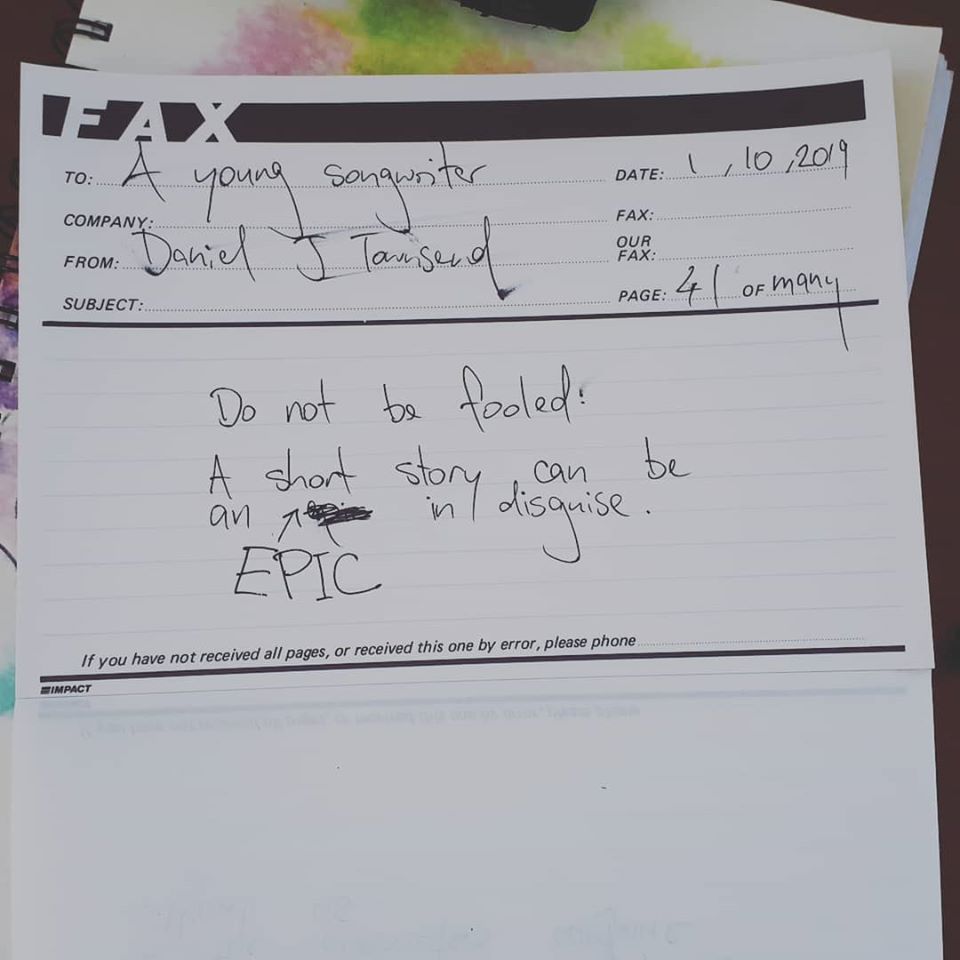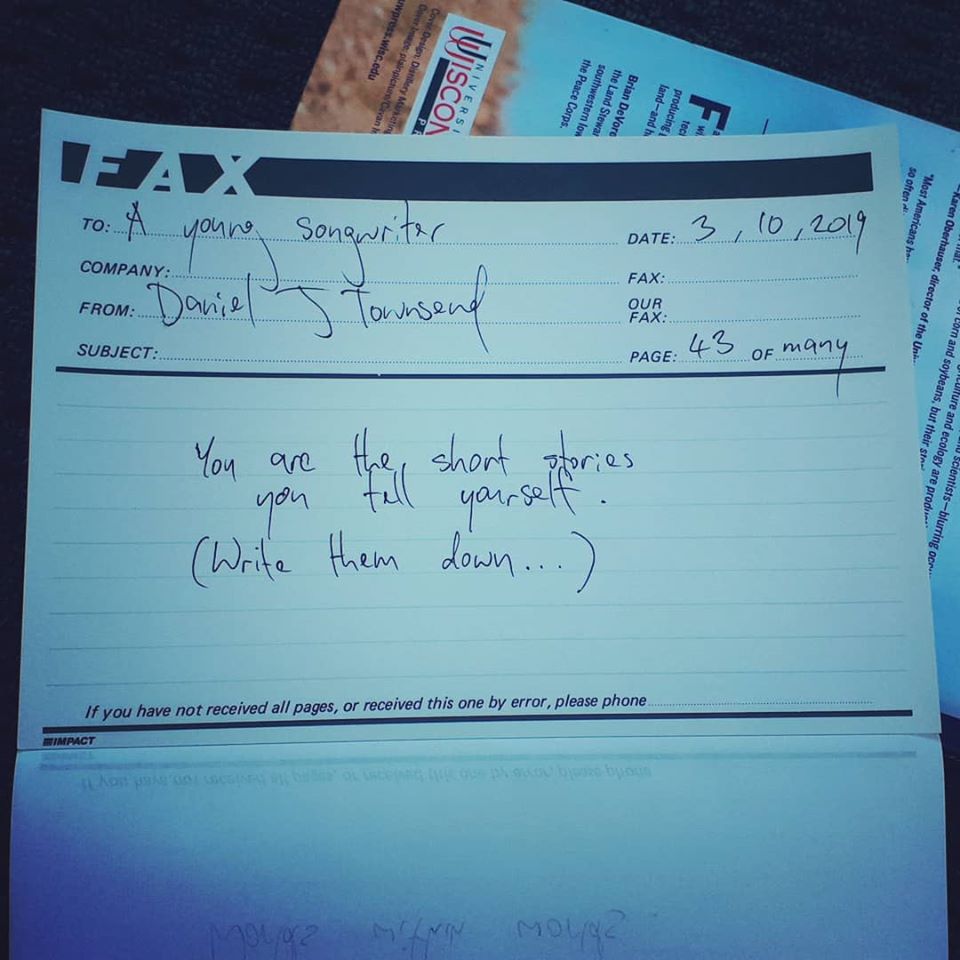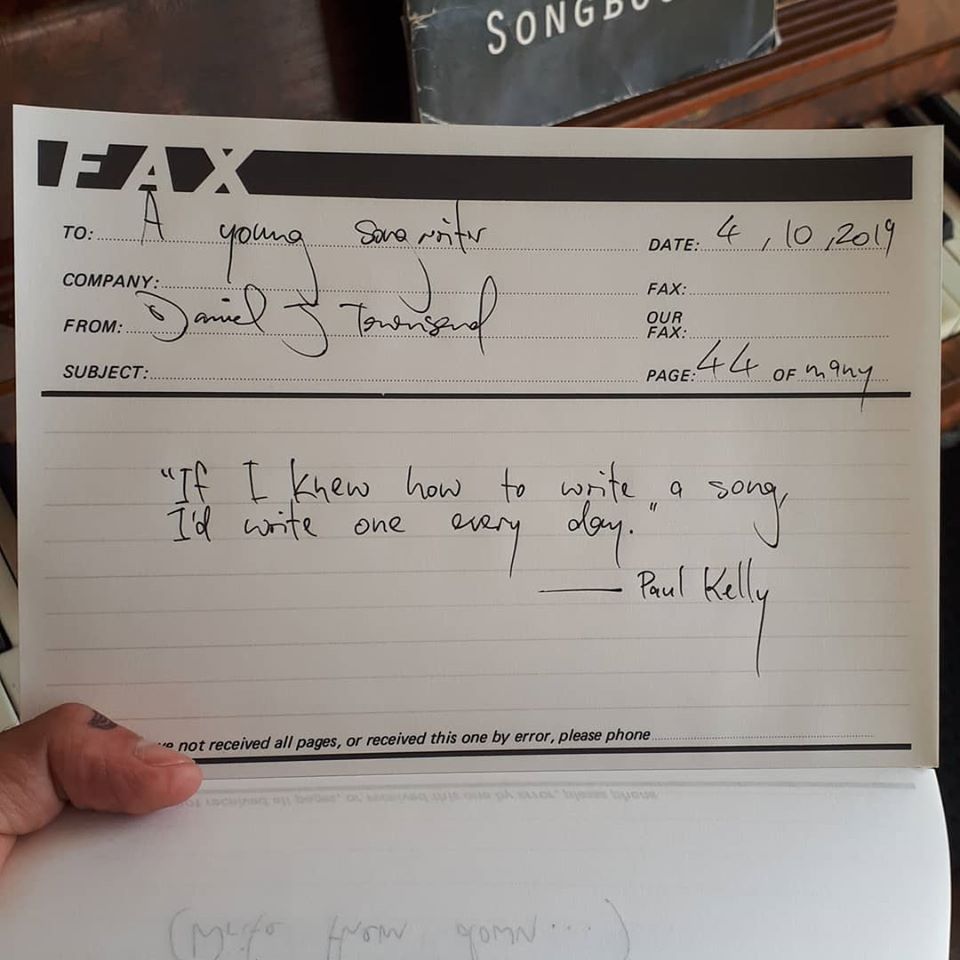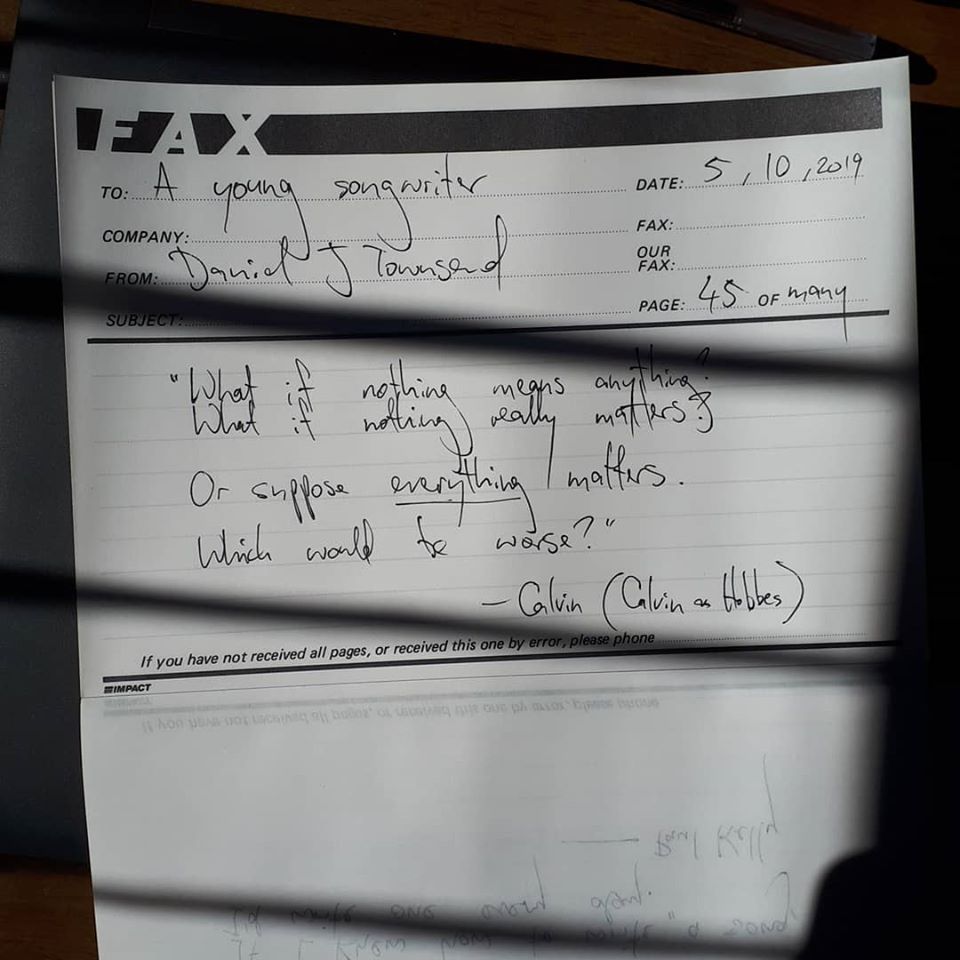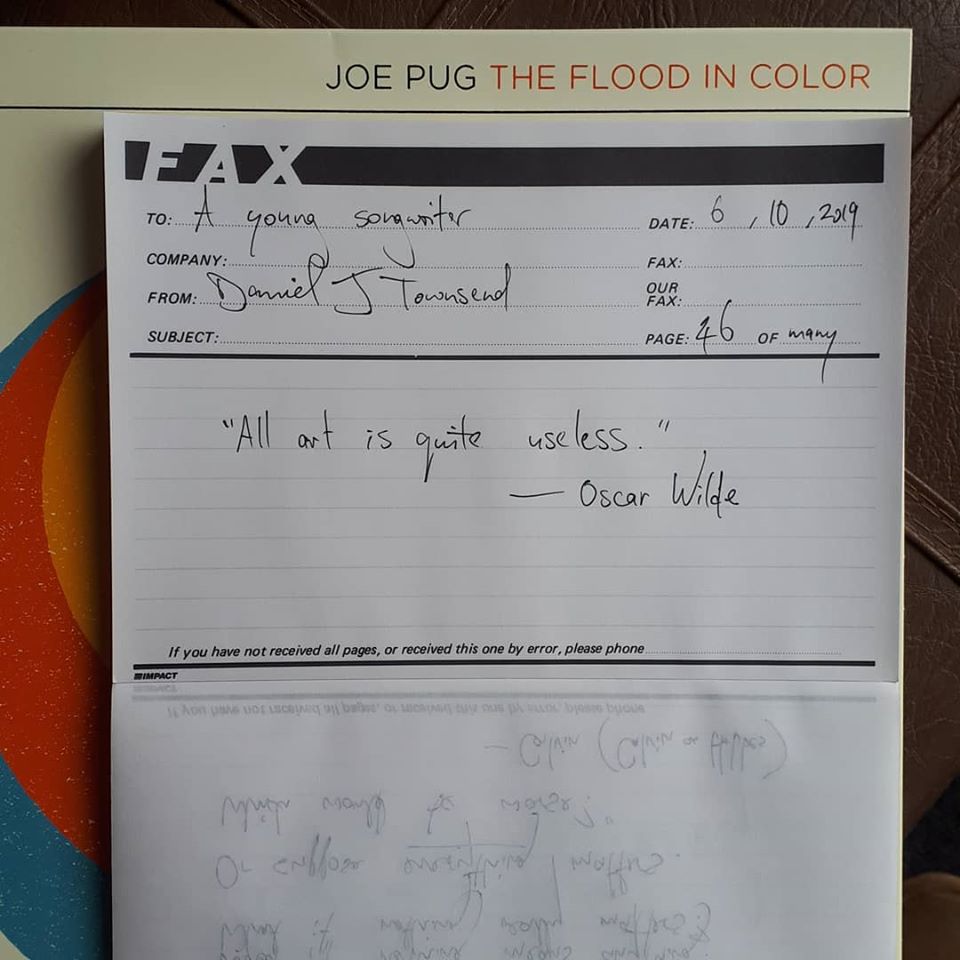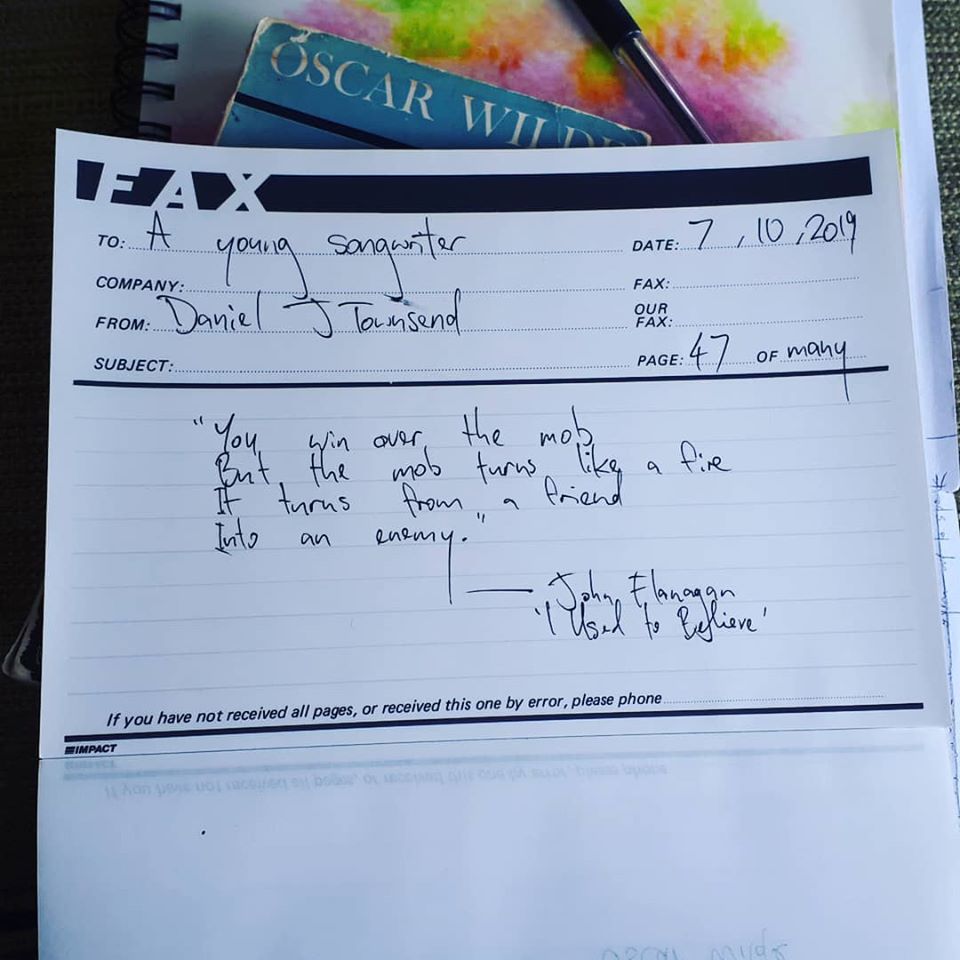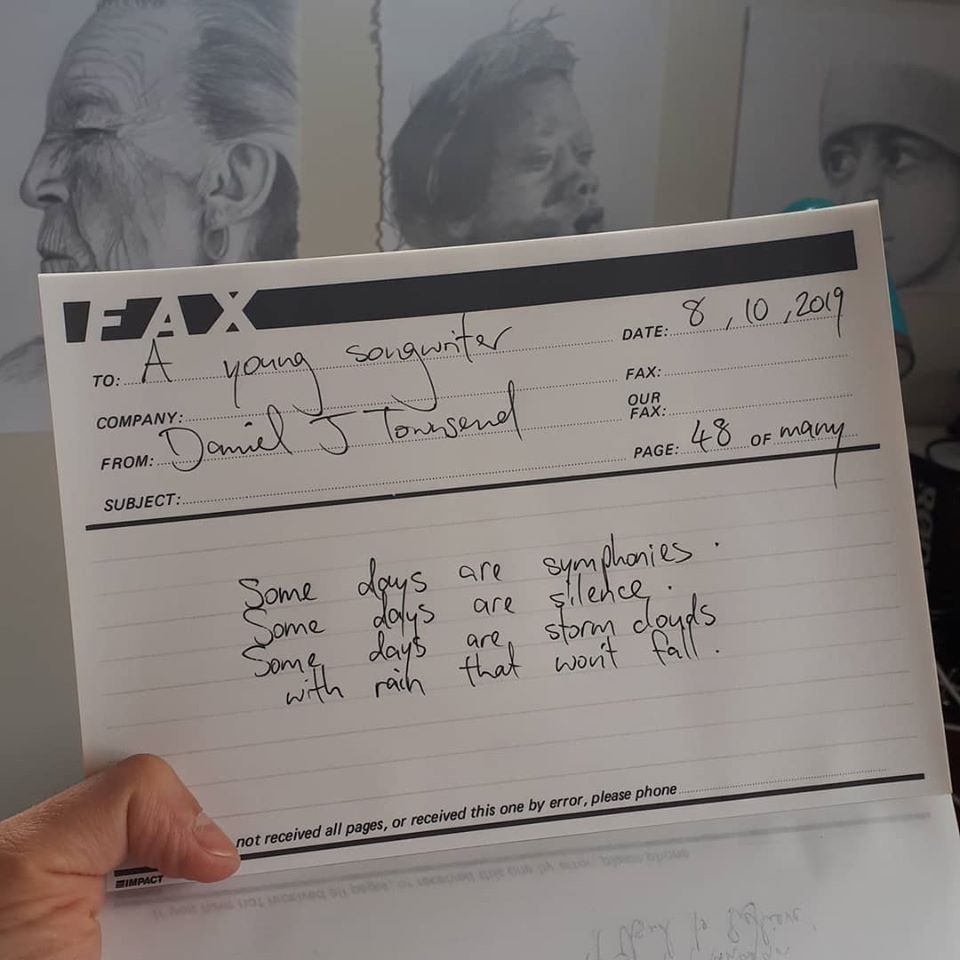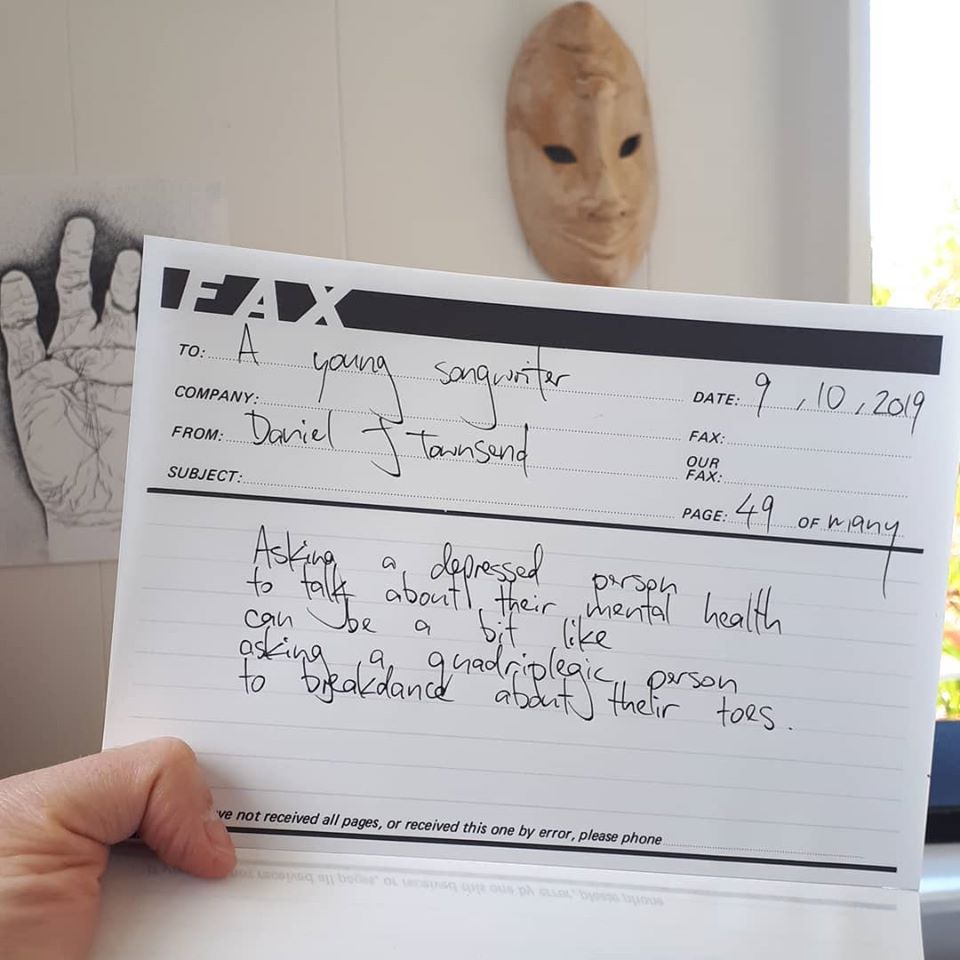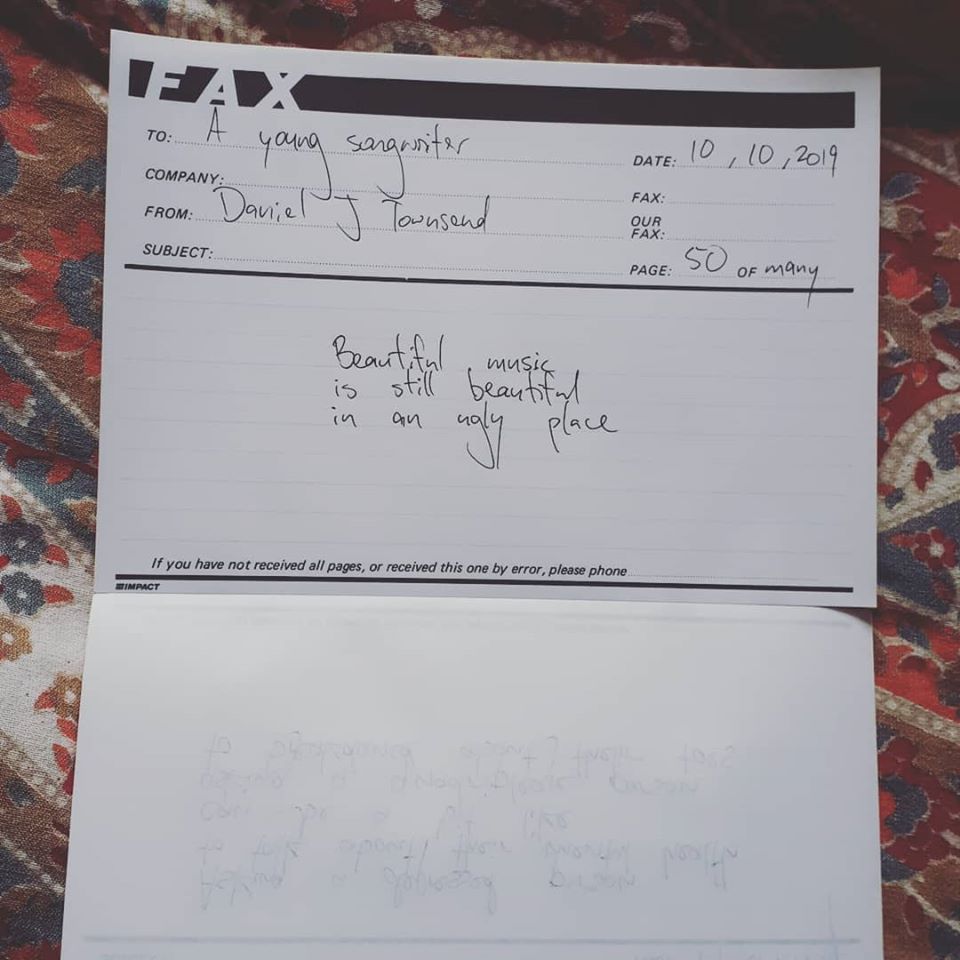The coach pulled in to the Greyhound terminal, sweltering Wet Season streets shining like a postcard. How many hours had he been on that bloody bus? He had fallen in and out of so many half-dreams, head resting on the window, he felt like he'd been in a car wreck. Didn't even know what day it was. The pub across the road was advertising $5 pints, but he kicked the thought out of his head. He wanted to surprise her, buy her something nice. And the kids. He fed his last gold coins into the vending machine, bought a couple of Mars bars for the boys. And one for himself. Then he stepped into the rain, over to the bottle-o, hoping for the Chardonnay she used to like when they were teenagers, kissing in the park. Then he hailed a Silvertop. She would pay the fare.
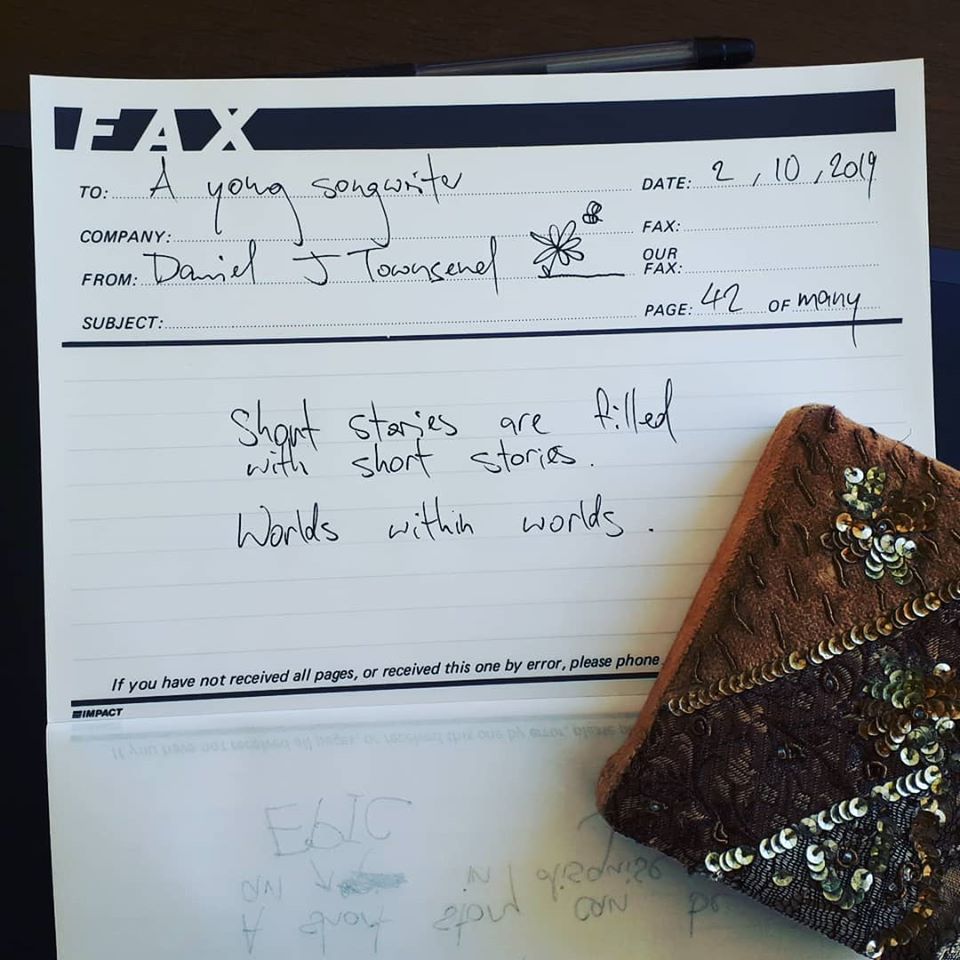
There is always a bird nearby, singing. Often there's more than one, a gently cacophonic jazz choir forested away on branches I can't see. Or up on the wire.
When I am anxious or stressed or just quicksanding into The Nothing, I have to choose to listen. It's uncanny. They aren't there, but then they are. Chittering and nattering away, calling out for a loved one or just giving voice to the joy of sunlight in their little bones.
I listen for the lullabies of little lives. I must. Life is a million tiny things.
When I am anxious or stressed or just quicksanding into The Nothing, I have to choose to listen. It's uncanny. They aren't there, but then they are. Chittering and nattering away, calling out for a loved one or just giving voice to the joy of sunlight in their little bones.
I listen for the lullabies of little lives. I must. Life is a million tiny things.
I was born with three fingers on my left hand. No-one has ever explained this to me. It's just one of those things, you know: Meaningless, like the universe and the billions of blazing stars within it. The stars which (predominantly ten-fingered) humans have arranged into shapes and stories and patterns and prophecies. Constellation divination. Metaphors and maps. We've thrown a whole lot of meaning at those things. I'm cool with it. If meaning didn't exist, it would be necessary to invent it.
So, I've got this three-fingered meaninglessness where a fully functioning meaningless should be. I don't know why, other than the old rolling of the dice, I guess.
It's funny how meaningful that left hand has become for me. It meant I didn't really play with the other kids until high school, which meant I found ways to use my intelligence to pacify my simple-minded tormentors, to win them over to curiosity, to inspire them to value difference. It meant I focused on my art, which included learning to play guitar, rather than my social circle, which meant a whole bunch of wonderful things, including what you are reading now.
So, what's the story I tell myself? When I was younger the story was "I was born different and this has made me different. I am special." As I've matured, the story has become "If you really want to do something, find a way. Keep your heart open to people who feel left out or pushed aside."
Stupid little hand. Love you.
So, I've got this three-fingered meaninglessness where a fully functioning meaningless should be. I don't know why, other than the old rolling of the dice, I guess.
It's funny how meaningful that left hand has become for me. It meant I didn't really play with the other kids until high school, which meant I found ways to use my intelligence to pacify my simple-minded tormentors, to win them over to curiosity, to inspire them to value difference. It meant I focused on my art, which included learning to play guitar, rather than my social circle, which meant a whole bunch of wonderful things, including what you are reading now.
So, what's the story I tell myself? When I was younger the story was "I was born different and this has made me different. I am special." As I've matured, the story has become "If you really want to do something, find a way. Keep your heart open to people who feel left out or pushed aside."
Stupid little hand. Love you.
It's the impossible question: How do you write a song? It depends, it depends. Sometimes this, sometimes that, sometimes they arrive fully formed but mostly you carve them out of stone. It's a very boring conversation, and it's a conversation I've wriggled out of many times.
A better question is "How did you write that song?" Every song has a story.
I wrote The Builder's Boy with one sock on, half dressed after a shower. I wrote Fish and Chips at the Neighbours' Place as a study in the using only the "ay" sound for rhyme. Musselroe Bay was another one. I wrote Waiting For The Storm several times between 2011 and 2018 and finished it after living through Cyclone Marcus in the NT.
Ultimately, nobody knows how to write a song. So you're in good company.
A better question is "How did you write that song?" Every song has a story.
I wrote The Builder's Boy with one sock on, half dressed after a shower. I wrote Fish and Chips at the Neighbours' Place as a study in the using only the "ay" sound for rhyme. Musselroe Bay was another one. I wrote Waiting For The Storm several times between 2011 and 2018 and finished it after living through Cyclone Marcus in the NT.
Ultimately, nobody knows how to write a song. So you're in good company.
When things are going well, I'm a prolific and brilliant songwriter with a receptive, appreciative audience. When things are not going well, I'm a grown-up without proper grown-up skills who is wasting his stupid, stupid life.
Don't send me sympathy mail. That's not my point. What I'm saying is that us creative folks tend to think (and live) in extremes. Either everything matters or nothing does, you know?
I was raised by religion. Places of worship, big crosses and all that. A lot of people in that world believed everything was meaningful. The clouds rained to teach us a lesson and test our faith. They stopped raining to teach us another lesson and test our faith in another way. You met a person interested in your faith? The heavens are smiling. Someone told you to stop talking about your faith? Aha. Persecution makes you stronger.
For what it's worth, schizophrenics see meaning in everything too.
It's far cooler to believe everything is meaningless. Meaninglessness is the new religion. In fact, in my town, all the old religious iconography and language has been co-opted by an art gallery. They run a "temple of live music" called Altar and the Sydney Morning Herald has said there was "plenty to worship" at this year's festival, which included a "dark mass" in a city whose winter nights were illuminated by giant red crosses. But none of it means anything. Look! A wall of vaginas! A poop machine! Eat, drink and die merry! (Actually, I really enjoyed the festival. And I dig the art gallery too. Not that that means anything, of course.)
The way I see it, if everything matters then I'd better write bloody good songs. They might be played back to me in the Great Beyond or something. Or maybe they will just improve someone's life. On the other hand, if nothing matters, I'd better write bloody good songs. If this is all we've got, I'd best be filling the air with good sounds. Or maybe they will improve someone's life.
Don't send me sympathy mail. That's not my point. What I'm saying is that us creative folks tend to think (and live) in extremes. Either everything matters or nothing does, you know?
I was raised by religion. Places of worship, big crosses and all that. A lot of people in that world believed everything was meaningful. The clouds rained to teach us a lesson and test our faith. They stopped raining to teach us another lesson and test our faith in another way. You met a person interested in your faith? The heavens are smiling. Someone told you to stop talking about your faith? Aha. Persecution makes you stronger.
For what it's worth, schizophrenics see meaning in everything too.
It's far cooler to believe everything is meaningless. Meaninglessness is the new religion. In fact, in my town, all the old religious iconography and language has been co-opted by an art gallery. They run a "temple of live music" called Altar and the Sydney Morning Herald has said there was "plenty to worship" at this year's festival, which included a "dark mass" in a city whose winter nights were illuminated by giant red crosses. But none of it means anything. Look! A wall of vaginas! A poop machine! Eat, drink and die merry! (Actually, I really enjoyed the festival. And I dig the art gallery too. Not that that means anything, of course.)
The way I see it, if everything matters then I'd better write bloody good songs. They might be played back to me in the Great Beyond or something. Or maybe they will just improve someone's life. On the other hand, if nothing matters, I'd better write bloody good songs. If this is all we've got, I'd best be filling the air with good sounds. Or maybe they will improve someone's life.
Have you read The Ballad of Reading Gaol? It's the poem Oscar Wilde wrote while he was incarcerated, inspired by a murderer doomed to hang.
"He did not wear his scarlet coat," Wide observes. Strange thing to notice when looking at a man condemned.
This poem is not useless. It will break you, make you give thanks for the sky. This is a man who had had everything, lost everything and was destined to die agonisingly alone.
If he was alive today, Wilde might have married a man and fit right in. He certainly would never have written The Ballad of Reading Gaol and would probably never have even thought to step inside the gates.
The poem is about a man who murdered the one he loved. Wilde realises that, in a way, he himself has done the same thing. His wife. His two sons. His lover. His art. His reputation. His future.
Each man kills the thing he loves
By each let this be heard,
Some do it with a bitter look,
Some with a flattering word,
The coward does it with a kiss,
The brave man with a sword.
Wilde, by his own admission, is a cowardly killer. But he is a killer nonetheless. So are we. Bitter looks destroy people. Our well-intentioned flattery distorts them. Speak only in truth, Wide seems to say, so you will not kill the thing you love. Maybe, speaking in truth, you will actually give life to the thing you love.
All bitter looks are quite useless. All flattery is quite useless. All cowardliness is quite useless. All weapons are quite useless.
Speak the truth and save your own life. And always dress well.
"He did not wear his scarlet coat," Wide observes. Strange thing to notice when looking at a man condemned.
This poem is not useless. It will break you, make you give thanks for the sky. This is a man who had had everything, lost everything and was destined to die agonisingly alone.
If he was alive today, Wilde might have married a man and fit right in. He certainly would never have written The Ballad of Reading Gaol and would probably never have even thought to step inside the gates.
The poem is about a man who murdered the one he loved. Wilde realises that, in a way, he himself has done the same thing. His wife. His two sons. His lover. His art. His reputation. His future.
Each man kills the thing he loves
By each let this be heard,
Some do it with a bitter look,
Some with a flattering word,
The coward does it with a kiss,
The brave man with a sword.
Wilde, by his own admission, is a cowardly killer. But he is a killer nonetheless. So are we. Bitter looks destroy people. Our well-intentioned flattery distorts them. Speak only in truth, Wide seems to say, so you will not kill the thing you love. Maybe, speaking in truth, you will actually give life to the thing you love.
All bitter looks are quite useless. All flattery is quite useless. All cowardliness is quite useless. All weapons are quite useless.
Speak the truth and save your own life. And always dress well.
I've been reading Oscar Wilde. And thinking about Michael Jackson.
It was said of Wilde: "In his lifetime he charmed his friends out of criticism and irritated his enemies out of reason. The hatred of the latter found full vent during the ostracism that followed his trial, and turned the tide in his favour when the new generation came along. The harrowing nature of his punishment evoked that sympathy which is safely and easily accorded the martyrs of another age." (Hesketh Pearson)
History rewritten. I wonder how Wilde's wife remembered him. Or his sons. One of them wrote a book. Complicated, just like life.
These days it's hard to remember how wildly popular Michael Jackson was. When I was a kid, he was the King. Almost divine. Safe to say he had charmed his friends (and fans) out of criticism. Then he was put on trial. His career died for a bit, then was resurrected. He was put on trial again. Death and resurrection. Then he died. Same again.
More recently, with the release of the film Leaving Neverland, he was tried and found guilty in the court of public opinion. It was as if the world had dug him up, cut him to pieces, then left him for the crows. Nevertheless, last month I walked through one northern city's streets and heard no fewer than five MJ songs in as many hours.
History rewritten and rewritten. Mobs being won over again and again.
"The truth is rarely pure and never simple."
Guess who said that.
It was said of Wilde: "In his lifetime he charmed his friends out of criticism and irritated his enemies out of reason. The hatred of the latter found full vent during the ostracism that followed his trial, and turned the tide in his favour when the new generation came along. The harrowing nature of his punishment evoked that sympathy which is safely and easily accorded the martyrs of another age." (Hesketh Pearson)
History rewritten. I wonder how Wilde's wife remembered him. Or his sons. One of them wrote a book. Complicated, just like life.
These days it's hard to remember how wildly popular Michael Jackson was. When I was a kid, he was the King. Almost divine. Safe to say he had charmed his friends (and fans) out of criticism. Then he was put on trial. His career died for a bit, then was resurrected. He was put on trial again. Death and resurrection. Then he died. Same again.
More recently, with the release of the film Leaving Neverland, he was tried and found guilty in the court of public opinion. It was as if the world had dug him up, cut him to pieces, then left him for the crows. Nevertheless, last month I walked through one northern city's streets and heard no fewer than five MJ songs in as many hours.
History rewritten and rewritten. Mobs being won over again and again.
"The truth is rarely pure and never simple."
Guess who said that.
I'm in a foul mood today. That happens sometimes. Like Tasmanian weather, sometimes my skies are inexplicably thunderous; a million tiny grey circles on the river.
I'm going for a swim. Then I'm going to write.
I'm going for a swim. Then I'm going to write.
Tasmanians talk about the weather several times a day. This is because the weather changes several times a day. We are either preparing for the weather, repairing after the weather or simply expressing surprise at how our skies say the darndest things. You have to be aware. Sunshine turns to snow turns to helicopter rescues all the time.
Territorians seldom speak of the weather, because it's so weirdly consistent. The Dry Season is basically six months of sunny Groundhog Days. Territorians tend to speak in seasons, in years and sometimes in decades. (This Build-Up is dragging on a bit... This Wet Season was drier than last year's... We get a really big cyclone every forty years...)
I feel a lot of conversation about mental health is like talking about Tassie weather. It's now. We're either running with rain-soaked shoulders or we're braving it with short sleeves for the day. Asking someone about their mental health tends to evoke immediate weather reports. It takes a fair amount of self-awareness to even know you're in a Dry Season, a Build-Up or a Wet, and to compare this season with the last one, or the season in 2009. It takes a whole lot more to be able to tell someone about it.
It's impossible to talk Wet Season without a cyclone looming on the edge of the conversation. That's where cyclones live. And that's not wrong. It's just what the weather does, up there. Down here, the weather is cold then warm then cold again and you just have to be ready.
Right now in Tasmania it's sunny, warm and dry. Scientists tell us this is not necessarily a good thing.
Territorians seldom speak of the weather, because it's so weirdly consistent. The Dry Season is basically six months of sunny Groundhog Days. Territorians tend to speak in seasons, in years and sometimes in decades. (This Build-Up is dragging on a bit... This Wet Season was drier than last year's... We get a really big cyclone every forty years...)
I feel a lot of conversation about mental health is like talking about Tassie weather. It's now. We're either running with rain-soaked shoulders or we're braving it with short sleeves for the day. Asking someone about their mental health tends to evoke immediate weather reports. It takes a fair amount of self-awareness to even know you're in a Dry Season, a Build-Up or a Wet, and to compare this season with the last one, or the season in 2009. It takes a whole lot more to be able to tell someone about it.
It's impossible to talk Wet Season without a cyclone looming on the edge of the conversation. That's where cyclones live. And that's not wrong. It's just what the weather does, up there. Down here, the weather is cold then warm then cold again and you just have to be ready.
Right now in Tasmania it's sunny, warm and dry. Scientists tell us this is not necessarily a good thing.
In the undercover carpark
She sang a Beatles song
My daughters sat down at her feet
And softly sang along
(You made me cry, Lasca Dry.)
She sang a Beatles song
My daughters sat down at her feet
And softly sang along
(You made me cry, Lasca Dry.)
